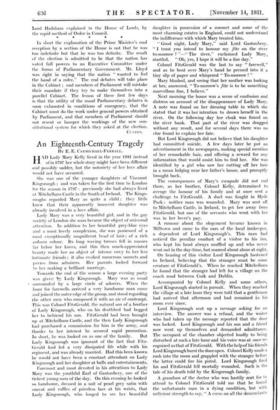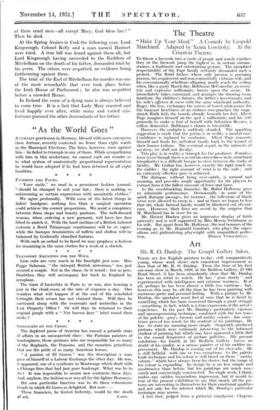An Eighteenth-Century Tragedy
BY E. E. CARMICHAEL-FERRALL.
HAD Lady Mary Kelly lived in the year 1931 instead of in 1797 her whole story might have been different and possibly sadder, but the notoriety of her love affair would not have occurred.
She was one of the younger daughters of Viscount Kingsrough ; and was taken for the first time to London for the season in 1797: previously she had always lived at Mitchelham Castle in the South of Ireland. The Kings- .roughs regarded Mary as quite a child : they little knew that their apparently innocent daughter was already involved in a love affair.
Lady Mary was a very beautiful girl, and in the gay society of London she soon became the object of universal attention. In addition to her beautiful grey-blue eyes and a most lovely complexion, she was possessed of a most exceptionally magnificent head of hair ; of a rich auburn colour. Its long waving tresses fell in masses far below her knees, and this then much-appreciated beauty made her an object of intense envy to her less fortunate friends ; it also evoked numerous sonnets and poems from admirers. Her parents looked forward to her making a brilliant marriage.
. Towards the end of the season a large evening party was given Lady King,srough. Mary was as usual • surrounded by a large circle of adorers: When the hour for farewells arrived a very handsome man came and joined the outer edge of the group, and stood regarding the other men who composed it with an air of contempt.
This was Colonel FitzGerald, the natural son of a brother of Lady Kingsrough, who on his deathbed had begged her to befriend his son. FitzGerald had been brought up at Mitchelham Castle, and the then Lady Kingsrough had purchased a commission for him in the army, and thanks to her interest he secured rapid promotion.
In short, he was looked on as one of the family. But Lady Kingsrough was ignorant of the fact that Fitz- Gerald had led a very dissipated life while with his regiment, and was already married. Had this been known he would not have been a constant attendant on Lady Kingsrough and her daughter at balls and entertainments.
Foremost and most devoted in his attentions to Lady Mary was the ,youthful Earl. of Gastonbery, one of the richest young men of the day. On this evening he looked so handsome, dressed in a suit of pearl grey satin with cravat and ruffles of priceless lace at his wrists, that Lady Kingsrough, who longed to see her . beautiful daughter in possession of a coronet and some of the most charming estates in England, could not understand the indifference with which Mary treated him.
" Good night, Lady Mary," said Lord Gastonbery. " I trust you intend to honour my fete on the river to-morrow ? "—" The river," exclaimed Lady Mary, startled. " Oh, yes, I hope it will be a fine day."
Colonel FitzGerald was the last to say " farewell," and as he bent over Mary's hand he pressed into it a tiny slip of paper and whispered " To-morrow ! "
Mary blushed, and seeing that her mother was looking at her, answered, " To-morrow's fete is to be something marvellous fine, I believe."
Next morning the house was a scene of confusion and distress on account of the disappearance of Lady Mary.
A note was found on her dressing table in which she stated that it was her intention to drown herself in the river. On the following day her cloak was found on the river bank. That part of the river was dragged without any result, and for several days there was no clue found to explain her fate.
But Lord Kingsrough did not believe that his daughter had committed suicide. A few days later he put an advertisement in the newspapers, making special mention of her remarkable hair, and offering a reward for any information that would assist him to find her. She was identified by a girl who saw her cutting off her hair in a mean lodging near her father's house, and promptly brought back.
The consequences of Mary's escapade did not end there, as her brother, Colonel Kelly, determined to avenge the honour of his family and at once sent a challenge to FitzGerald. A duel was fought in Hyde Park ; neither man was wounded. Mary was sent off to Mitchelham Castle, in Ireland, to get her away from FitzGerald, but one of the servants who went with her was in her lover's pay.
A rumour about the elopement became known in Milltown and came to the ears of the local innkeeper, a dependent of Lord Kingsrough's. This man had noticed the peculiar conduct of a visitor to his inn, who kept his head always muffled up and who never went out in the day-time, but roamed about alone at night.
On hearing of this visitor Lord Kingsrough hastened to Ireland, believing that the stranger must be some creature of FitzGerald's. When he reached Mitchelham lie found that the stranger had left for a village on the coach road between Cork and Dublin.
Accompanied by Colonel Kelly and some others, Lord Kingsrough started in pursuit. When they reached the village at a late hour they were told that a gentleman had arrived that afternoon and had remained in his room ever since.
Lord Kingsrough sent up a message asking for an interview. The answer was a refusal, and the waiter who had taken up the message reported that the door was locked. Lord Kingsrough and his son and a friend now went up themselves and demanded admittance. The occupant of the chamber objected loudly to being disturbed at such a late hour and his voice was at once re- cognized as that of FitzGerald. With the help of his friends Lord Kingsrough burst the door open. Colonel Kelly made a rush into the room and grappled with the stranger before the latter could fire his pistol. Lord Kingsrough fired his and FitzGerald fell mortally wounded. Such is the tale of his death told by the Kingsrough family.
A grandson of the doctor who was hastily sent for to attend to Colonel FitzGerald told. me that he found the unfortunate man in a dying condition, but with sufficient strength to say, " A curse on all the descendants of these cruel men—all except Mary, God bless her ! " Then he died.
At, the Spring Assizes in Cork the following year, Lord Kingsrough, Colonel Kelly and a man named Hartnet were tried. A true bill was found against them all, but Lord Kingsrough having succeeded to the Earldom of Mitchelham on the death of his father, demanded trial by his peers. The others were acquitted, no evidence being forthcoming against them.
The trial of the Earl of Mitchelham for murder was one of the most remarkable that ever took place before the Irish House of Parliament ; he also was acquitted before a crowded House.
In Ireland the curse of a dying man is always believed to come true., It is a fact that Lady Mary married and Jived happily ever after, while many and varied mis- fortunes pursued the other descendants of her father.



































 Previous page
Previous page